Eclector
Jan Moringen (scymtym on IRC)
Agenda
Goal: Introduce and demonstrate Eclector, mainly from a user's perspective.
- Introduction and project history
- Features (roughly based on structure of documentation)
- Errors and error recovery (with demo)
- Customizing ordinary reader features (with demo)
- Skipped inputs and lower-level entry-points (with demo)
- Parse results (with demo)
- Performance
- Problems and future work
Introduction
Introduction: What is the Common Lisp Reader?
The Common Lisp reader is not single object or concept but a rather lose collection of things described in chapter 2 of the specification.
| Conceptually | Technically |
|---|---|
| Characters, syntax types | set-syntax-from-char |
| Readtable, variables | *readtable*, *read-eval*, *read-base*, … |
| Reader algorithm | read, read-preserving-whitespace, read-from-string |
| Token interpretation | ? (parse-integer belongs to numbers) |
| Standard macros | get-macro-character, get-dispatch-macro-character, … |
Control and customization of some aspects through readtables and variables.
Project History
- Started by Robert Strandh as the reader for SICL (old goal: conforming reader implementation).
- Extracted from SICL (and named) by Robert Strandh (new goal: portable and extensible reader implementation)
- Completed, made extensible and now maintained by Jan Moringen
So, the name …
The Eclector was the main ship used by Yondu's clan of Ravagers serving as a port to the M-ships. https://marvelcinematicuniverse.fandom.com/wiki/Eclector
I don't know how people could miss such an obvious reference. I mean, with beach talking about comics all the time and everything.
But seriously: Eclector, Eclector.
Project Goals
Create an implementation of the Common Lisp reader algorithm and surrounding machinery that
- conforms to the specification
- provides excellent, translatable, error messages for all possible syntax errors (and allows user-defined macros to do the same)
- can recover from all possible syntax errors (which does not mean it can magically fix invalid code)
- is highly extensible and customizable (beyond the standard mechanisms such as reader macros and syntax types)
- supports source location tracking and parse result construction
- achieves acceptable performance for most clients and use-cases (possible exceptions: reading huge amounts of numeric data)
Non-goal: support for loading an entire
file (more on that later)
Project Anatomy
- Implementing a specification
Implementing a specification is great! … but our favorite one doesn't cover everything. For example, which of the following are valid?
#S A proper list of a structure type name and initargs must follow #S.(foo)#C (1 2)#C#|foo|#(1 2)#C#+true(1 2)#C#.(list 1 2)`#',Unquote is illegal in the function reader macro.foo- Size (generated using David A. Wheeler's 'SLOCCount'.)
codedirectory4,124 lines testdirectory2,930 lines cost to make $ 433,634 - Tests
- Very close to 100 % branch coverage (there are still bugs, but regressions are extremely unlikely).
- Documentation
texinfo-based with homegrown syntax highlighting.
Clients
- SICL
- Uses Eclector as the Common Lisp reader
- Clasp
- Uses Eclector as the Common Lisp reader
- yitzi et al's common-lisp-jupyter
- Completion
- GrammaTech's software evolution library and s-expression diff
- Uses Eclector to construct syntax trees
- Shinmera's staple documentation system
- Example source highlighting and cross-referencing
- Second Climacs (future)
- Highlighting, syntax checking, basis for static analysis etc.
Side node: There is clear demand for "Eclector but at the s-expression syntax level".
Errors and Error Recovery
Errors: Conditions
At the character level, there are many possible ways of violating the specified Common Lisp syntax:
(1 2 3While reading list, expected the character ) when input ended.::fooA symbol token must not start with two package markers as in ::name.#\HyperUnrecognized character name: "Hyper"#10R89bThe character b is not a digit in base 10.76`(:foo ,)An object must follow a unquote.
To produce good error messages for as many of those as possible,
Eclector can specifically detect around
99
kinds of syntax errors for which it has corresponding
condition types. Such as:
Errors: Recovery
For applications such
- editors
- IDEs
- syntax checkers
- static analyzers
it is important to continue processing source code after encountering errors.
(defun foo (x y)
(+ x #b002The character 2 is not a digit in base 2.0101 (code-char #\RetrnUnrecognized character name: "Retrn") Avoid tab.'(,Unquote not inside backquote.(frob::barDo not use unexported symbols. y)) #1#Reference to undefined label #1#.)
¶While reading list, expected the character ) when input ended.
The eclector.reader:recover restart (and convenience
function of the same name) can be used to recover and continue
reading after most syntax errors.
Errors: Recovery Example (1)
The simplest way or making a recovering reader is via the
eclector.reader:recover convenience function:
(handler-bind ((error #'eclector.reader:recover))
(print (eclector.reader:read-from-string "`(::foo ,")))
(ECLECTOR.READER:QUASIQUOTE (:FOO (ECLECTOR.READER:UNQUOTE NIL)))
Errors: Recovery Example (2)
For each error, this prints the error message, prints the restart
description and invokes eclector.reader:recover:
(handler-bind ((error (lambda (condition)
Avoid tab. Avoid tab. Avoid tab.(let ((restart (find-restart 'eclector.reader:recover)))
Avoid tab. Avoid tab. Avoid tab. (format t "Recovering from error:~%~2@T~A~%using~%~2@T~A~2%"
Avoid tab. Avoid tab. Avoid tab. Avoid tab. condition restart))
Avoid tab. Avoid tab. Avoid tab.(eclector.reader:recover))))
(print (eclector.reader:read-from-string "`(::foo ,")))
Recovering from error: A symbol token must not start with two package markers as in ::name. using Treat the character as if it had been escaped. Recovering from error: While reading unquote, expected an object when input ended. using Use NIL in place of the missing object. Recovering from error: While reading list, expected the character ) when input ended. using Return a list of the already read elements. (ECLECTOR.READER:QUASIQUOTE (:FOO (ECLECTOR.READER:UNQUOTE NIL)))
Errors: Acclimation Example
Condition and restart reports use the Acclimation library:
(let* ((language (make-instance 'acclimation:german))
(acclimation:*locale* (make-instance 'acclimation:locale :language language)))
(handler-bind ((error (lambda (condition)
Avoid tab. Avoid tab. Avoid tab. (let ((restart (find-restart 'eclector.reader:recover)))
Avoid tab. Avoid tab. Avoid tab. (format t "Behandle Fehler~%~2@T~A~%durch~%~2@T~A~2%"
Avoid tab. Avoid tab. Avoid tab. Avoid tab. condition restart))
Avoid tab. Avoid tab. Avoid tab. (eclector.reader:recover))))
(eclector.reader:read-from-string "`(::foo ,")))
Behandle Fehler Ein Symbol darf nicht mit zwei Paketmarkierungen beginnen wie bei ::name. durch Behandle die Zeichen als maskiert. Behandle Fehler Beim Lesen eines Antizitats wurde ein Objekt erwartet als die Eingabe endete. durch Verwende NIL anstelle des fehlenden Objekts. Behandle Fehler Beim Lesen einer Liste wurde das Zeichen ) erwartet als die Eingabe endete. durch Erstelle eine Liste bestehend aus den bereits gelesenen Elementen.
Background image: Public Domain, https://en.wikipedia.org/w/index.php?curid=33285421
Demo: Linting and Checking
- Console linter
- McCLIM-based graphical linter
Customizing Ordinary Reader Features
Customization: Architecture
Architecture Idea 1
Express all operations performed by the reader as a set of protocols in which each generic function accepts a client parameter.
Examples
(defgeneric eclector.reader:interpret-symbol-token (client input-stream Avoid tab. Avoid tab. Avoid tab. Avoid tab. Avoid tab. Avoid tab. token Avoid tab. Avoid tab. Avoid tab. Avoid tab. Avoid tab. Avoid tab. position-package-marker-1 Avoid tab. Avoid tab. Avoid tab. Avoid tab. Avoid tab. Avoid tab. position-package-marker-2)) (defgeneric eclector.reader:evaluate-feature-expression (client feature-expression))
Customization: Architecture
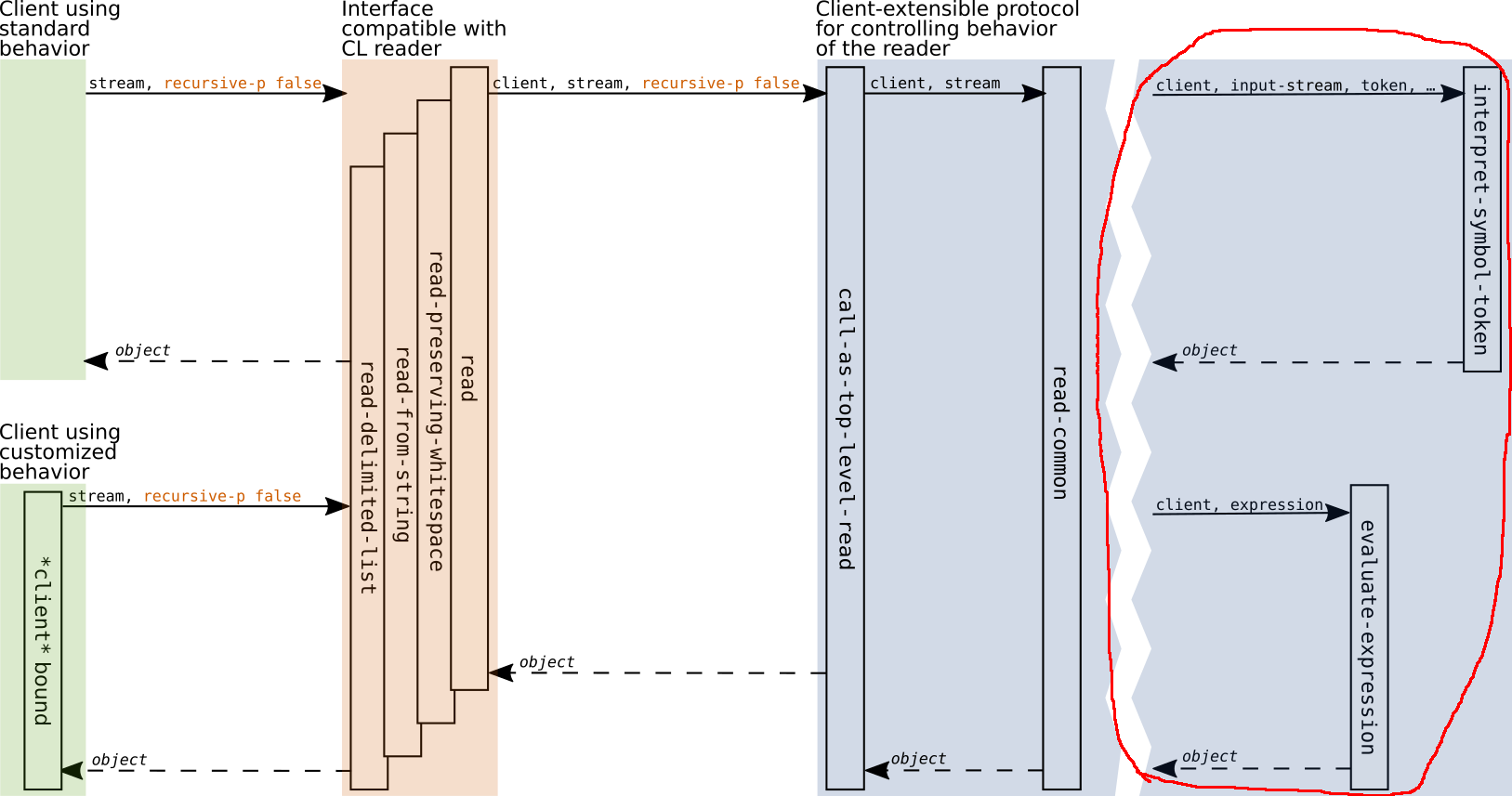
Customization: Sandboxing
Threats and extension points for corresponding mitigation:
- Read-time evaluation
eclector.reader:evaluate-expression- Structure constructors
eclector.reader:make-structure-instance- Uncontrolled interning
eclector.reader:interpret-symbol
Demo: Simple Sandboxed Reader
Writing a simple sandboxed reader using the mentioned methods:
- Read-time evaluation
eclector.reader:evaluate-expression- Structure constructors
eclector.reader:make-structure-instance- Uncontrolled interning
eclector.reader:interpret-symbol
Skipped Input and Lower-lever Entry Points
Skipped Input: Architecture
Architecture Idea 2
Notify the client when non-objects are encountered in the input and provide a
read-style function that does not skip over them.
Examples
(defgeneric eclector.reader:note-skipped-input (client input-stream reason)) (defgeneric eclector.reader:call-as-top-level-read (client thunk input-stream eof-error-p eof-value preserve-whitespace-p)) (defgeneric eclector.reader:read-maybe-nothing (client input-stream eof-error-p eof-value))
Skipped Input: Architecture
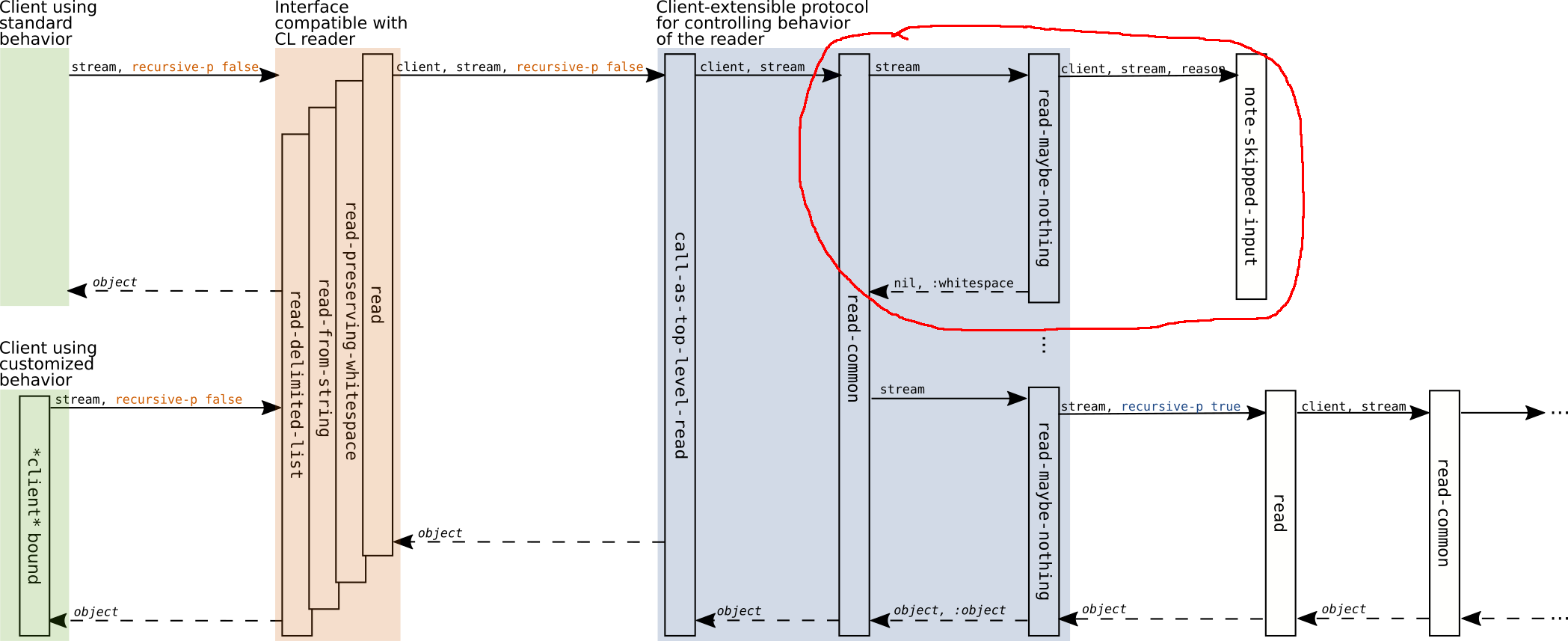
Demo: Syntax Highlighting
Before
(list 1 #|foo|# "bar"
Call
(highlight-code "<code class=\"src src-lisp\">(list 1 #|foo|# \"bar\"</code>")
After
(list 1 #|foo|# "bar"
¶While reading list, expected the character ) when input ended.
Used in this presentation and will be used in the Eclector manual.
Demo: Read-time Conditionals
- Read-time conditional checker
- Read-time conditional visualizer
Parse Results
Parse Results: Concrete and Abstract Syntax Trees
- Concrete Syntax Tree
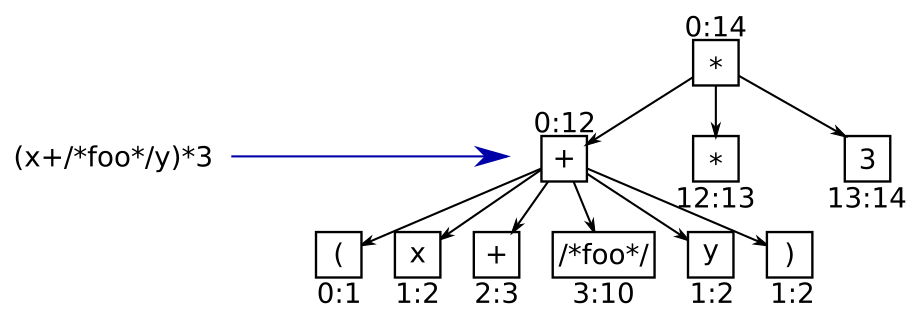
- Abstract Syntax Tree

Parse Results: Architecture
Architecture Idea 3
As a second way of using Eclector, weave the construction of source locations and parse results (for objects and skipped input) into the normal reader execution.
Examples
(defgeneric eclector.parse-result:source-position (client stream)) (defgeneric eclector.parse-result:make-expression-result (client result children source)) (defgeneric eclector.parse-result:make-skipped-input-result (client stream reason source))
Parse Results: Architecture
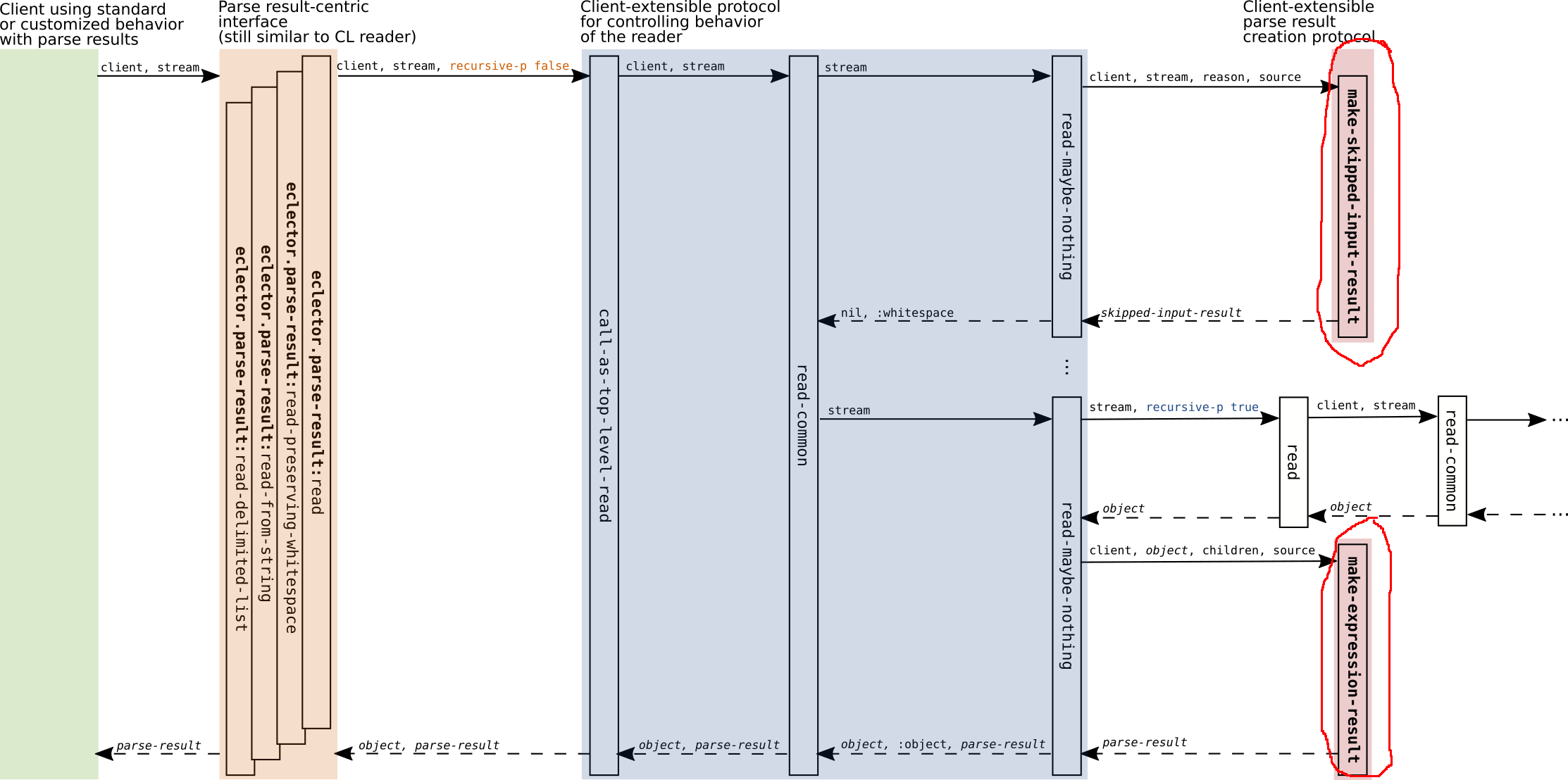
Demos: Applications of Parse Result
- Symbol spelling linter
- Parser thingy
Performance
Performance: Experiment
Test
(time (loop :repeat 10000
Avoid tab. :do (read-from-string "(1 (2 3) #+sbcl #1=\"foo\" `(,#1#))")))
SBCL 2.0.6.debian:
Evaluation took: 0.020 seconds of real time 0.020502 seconds of total run time (0.020502 user, 0.000000 system) 105.00% CPU 62,665,929 processor cycles 3,995,504 bytes consed
Eclector master:
Evaluation took: 0.150 seconds of real time 0.149348 seconds of total run time (0.149348 user, 0.000000 system) [ Run times consist of 0.011 seconds GC time, and 0.139 seconds non-GC time. ] 99.33% CPU 52 lambdas converted 449,065,278 processor cycles 86,892,784 bytes consed
Performance: Analysis
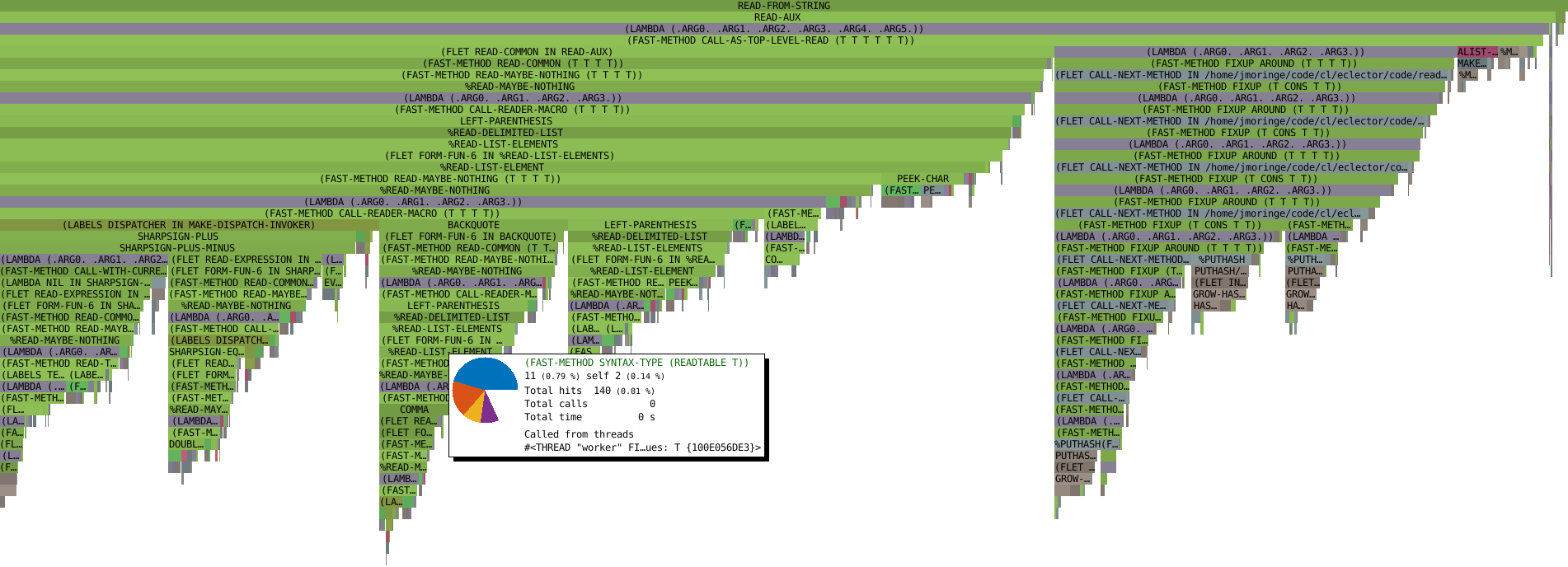
eclector.reader:fixupand friends is a big chunk (probably of the consing as well because of hash-table shenanigans)- The rest of the profile is relatively flat, but that little green thing is basically everywhere …
Future Work
Future Work: Float Construction
Current float construction is naive:
(let ((magnitude (* (+ (funcall decimal-mantissa)
Avoid tab. Avoid tab. (/ (funcall fraction-numerator)
Avoid tab. Avoid tab. Avoid tab. fraction-denominator))
Avoid tab. Avoid tab. (if exponentp
Avoid tab. Avoid tab. Avoid tab.(expt 10 (* exponent-sign (funcall exponent)))
Avoid tab. Avoid tab. Avoid tab.1))))
(return-from interpret-token
(* sign (coerce magnitude type))))
- Could use a proper algorithm.
But better let client decide:
(defgeneric make-float (client type sign decimal-mantissa fraction-numerator fraction-denominator exponent-sign exponent))- Or both.
Future Work: Symbol and Package Protocol
- Problem
- Custom symbol and package representations do not work
with some of the builtin behavior:
- Checking basic syntax of feature expression tests
- Checking basic syntax of structure literals
- …
- Solution(?)
- A protocol through which Eclector can handle
user-defined symbol and package
representations:
Future Work: Extensions
Existing and novels extensions:
::()- Rational float syntax
- Thousand separator
- hash-table literals
- Unicode character names
Future Work: Multi-column Error Locations
Future Work: Extensible Quasiquotation
Future Work: Performance
Future Work: org-export?
Thank You for Your Attention!
Eclector Resources:
- This presentation
- https://techfak.de/~jmoringe/presentation-eclector/slides.html
- IRC Channel
#siclon freenode- Code
- https://github.com/s-exressionists/eclector
- Documentation
- https://s-expressionists.github.io/Eclector/